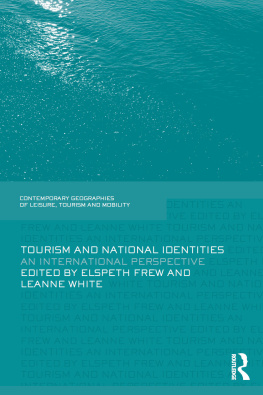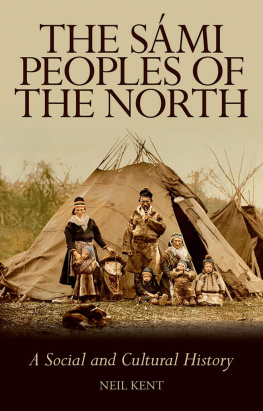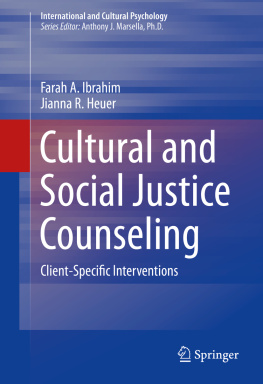
Travel, Tourism and Identity
EDITORIAL BOARD MEMBERS
Irving Louis Horowitz (19292012)
Founding Editor
Peter L. Berger
Director, Institute on Culture Religion, and World Affairs, Boston University
Hamid Dabashi
Hagop Kevorkian Professor of Iranian Studies and Comparative Literature, Columbia University
Robin Fox
Professor, Department of Anthropology, Rutgers University
Carl Gershman
President, National Endowment for Democracy
Eugene Goodheart
Edytha Macy Gross Professor of Humanities Emeritus, Brandeis University
Walter Laqueur
Distinguished Scholar, Center for Strategic and International Studies
Michael Ledeen
Freedom Scholar, Foundation for Defense of Democracies
Leslie Lenkowsky
Director of Graduate Programs for the Center on Philanthropy, Indiana University
Kenneth Minogue
Board of Directors, Centre for Policy Studies; Academic Advisory Council, Bruges Group
Nicholas Rescher
Professor, Department of Philosophy, University of Pittsburgh
Gabriel Ricci
Editor of Religion and Public Life; Chair, Dept of History, Elizabethtown College
David Ronfeldt
Senior Political Scientist, The RAND Corporation
Jeffrey Schaler
Professor, School of Public Affairs, American University
Dominique Schnapper
Member, French Constitutional Council; Director, Ecole des Hautes Etudes en Sciences Sociales
Lionel Tiger
Charles Darwin Distinguished Professor of Anthropology, Rutgers University
Murray Weidenbaum
Center on the Economy, Government & Public Policy; Washington University in St. Louis
Travel, Tourism and Identity
Culture & Civilization, Volume 7
Gabriel R. Ricci, editor
First published 2015 by Transaction Publishers
Published 2017 by Routledge
2 Park Square, Milton Park, Abingdon, Oxon OX14 4RN
711 Third Avenue, New York, NY 10017, USA
Routledge is an imprint of the Taylor & Francis Group, an informa business
Copyright 2015 by Taylor & Francis.
All rights reserved. No part of this book may be reprinted or reproduced or utilised in any form or by any electronic, mechanical, or other means, now known or hereafter invented, including photocopying and recording, or in any information storage or retrieval system, without permission in writing from the publishers.
Notice:
Product or corporate names may be trademarks or registered trademarks, and are used only for identification and explanation without intent to infringe.
ISSN: 1947-6280
ISBN 13: 978-1-4128-5676-8 (pbk)
On the Cover: Englishman in the Campagna by Carl Spitzweg, 18081885, (c. 1845)
Travel, Tourism and Identity
Culture & Civilization, Volume 7
Contents
Gabriel R. Ricci
William Hutton
Maria Kostaridou
Vasiliki Galani-Moutafi
David Wills
Loretta Proctor
John P. Bieter and Nina M. Ray
Velvet Nelson
Raquel Bello Vzquez
Elias J. Torres Feij
Kelly Virginia Phelan
A. Pablo Iannone
Bente Heimtun
Mahua Bhattacharya
Taso Lagos
Aeron Haynie
Jim Potts
Gabriel R. Ricci
IN FAMILIAR SURROUNDINGS, cultural patterns and social coherence are taken for granted. However, what assumptions may be unquestioned to a member of a particular social group could otherwise seem strange and require orientation to an outsider. When our confidence is shaken after encountering new surroundings, we quickly realize that our habitual behaviors and thinking might require some adjustment. Previously engrained knowledge may suddenly appear out of place and in need of recalibration, just as when we encounter a foreign tongue and realize that our passive understanding of language will now require grasping a new language in order to act and think in ways that were previously taken for granted. This psychological phenomenon is typically encountered through travel and in the role of a tourist where the environmental character of cultural patterns is pronounced.
Volume 7, Travel, Tourism and Identity of Culture & Civilization addresses what sorts of negotiations are involved when we establish transitory contact with another group or, in some cases, attempt to assimilate to a foreign space. Whether it is traveling alone, seeking exile, relocating as a group, or touring with a dedicated purpose, established identity, cultural uniqueness, and worldview can be placed in question. In some cases finding interpretive equivalents to match the environmental character of home may be within reach; in other cases, the traveler discovers that establishing new connections requires an orientation to a history and traditions that frame the local discourse and an awareness of political aspirations that define a future outlook. Making these connections will surely enhance the travelers or tourists experience; not making them risks ones becoming a marginalized figure, momentarily living without a history and detached from the promise of a communitys future. Success at social adjustment can be as simple as becoming familiar with something that was previously unknown and through a deliberate process of inquiry that something ultimately coheres with ones life experience. However, in the process, the traveler should be prepared to appear as a stranger, particularly if what seems as natural in a new environment to an indigenous population is disorienting to the traveler, who must first find his bearings.
As a stranger, the traveler enters a destination but can never be of that destination. In the lead article, William Hutton introduces this theme in the persona of Dio Chrysostom, the ancient Greek orator who repeatedly invoked his travels. Here, we find how the dislocation and deracination of the traveling personas point of view discovers a standpoint from which he can cast a critical eye on the status quo and the world of the familiar. More than Dios immediate predecessors, Hutton shows that Dio gives a central place to travel as a device for framing narratives and arguments and for establishing his own persona and authority. Hutton further speculates that we should see Dios emphasis on travel as one of the motivating factors in the emergence of travel-themed literature in the centuries that followed. Maria Kostaridou employs the travel record, both travelogue and autobiography, of John F. Usko to raise similar questions of personal and national identity. A Prussian by birth who spent most of his formative years in the cosmopolitan Ottoman port city of Smyrna before settling in England in the early nineteenth century, Usko found himself caught within a political crisis that altered the balance of power in the Levant. Uskos story reveals the tension between his alliance to Great Britain and Europe and his personal identification with the culture of the East and the Ottoman world.
Vasiliki Galani-Moutafi draws from historical and ethnographic studies to provide insights on travel and tourism in Greece that focus on representations of and interactions with the other. She notes how certain classifications and boundaries in regard to this dynamic are derived from ideology and politics and ultimately the national Greek identity. Classical representations and images of the country and its people in the texts of travelers as early as the eighteenth century are the sources for understanding these identity ambiguities.






